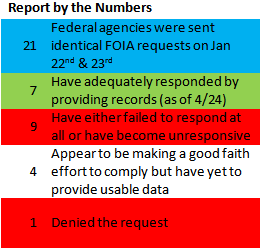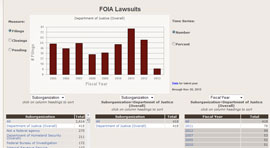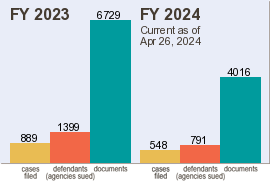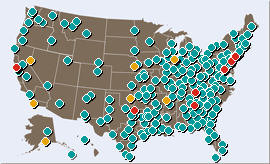81 new FOIA court documents
We have added 65 documents from 14 FOIA cases filed between April 26, 2015 and May 2, 2015. read more…
We have added 7 decisions of a procedural or substantive nature filed between April 19, 2015 and April 25, 2015. These are associated with 7 FOIA cases pending in federal district court. read more…
We have added 14 documents from 3 FOIA cases filed between April 19, 2015 and April 25, 2015. read more…
 It took the Department of Homeland Security Headquarters Division just nine business days to provide data in response to a simple Freedom of Information Act request sent to it and 20 other federal agencies.
It took the Department of Homeland Security Headquarters Division just nine business days to provide data in response to a simple Freedom of Information Act request sent to it and 20 other federal agencies.
The Department of Justice’s Civil Rights Division came through a day later; two days after that, we received data from Justice’s Management Division. Soon, the records from the Fish & Wildlife Service arrived, then the Army, and then the Bureau of Land Management. Earlier this week, data arrived from United States Citizenship and Immigration Services.
Now 65 business days after the FOIA requests were sent to the 21 agencies, only those seven have furnished complete and usable records in response. Several others have made good-faith efforts to comply and appear to be working toward providing data.
Ten agencies have either failed to respond at all, have become unresponsive at some point in the process, or, in the case of the CIA, have outright denied the request.
Among those who have failed to comply: The Justice Department’s Office of Information Policy, the federal entity that, according to its own website, is “responsible for encouraging agency compliance with the Freedom of Information Act (FOIA).”
We have added 7 decisions of a procedural or substantive nature filed between April 12, 2015 and April 18, 2015. These are associated with 7 FOIA cases pending in federal district court. read more…
We have added 33 documents from 7 FOIA cases filed between April 12, 2015 and April 18, 2015. read more…
We have added 8 decisions of a procedural or substantive nature filed between April 5, 2015 and April 11, 2015. These are associated with 7 FOIA cases pending in federal district court. read more…
We have added 72 documents from 13 FOIA cases filed between April 5, 2015 and April 11, 2015. read more…
We have added 20 decisions of a procedural or substantive nature filed between March 29, 2015 and April 4, 2015. These are associated with 18 FOIA cases pending in federal district court. read more…
We have added 47 documents from 10 FOIA cases filed between March 29, 2015 and April 4, 2015. read more…
 Recent Tweets
Recent Tweets


